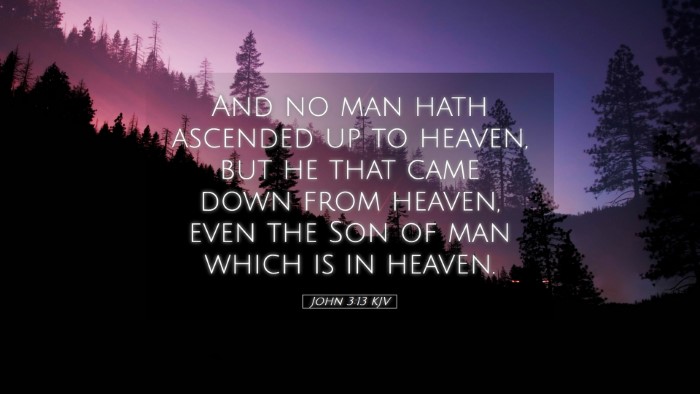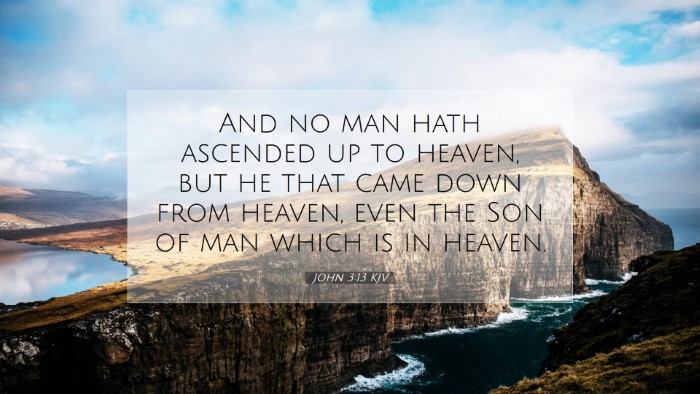Commentary on John 3:13
Verse: "And no man hath ascended up to heaven, but he that came down from heaven, even the Son of man which is in heaven." (John 3:13)
Introduction
The verse of John 3:13 encapsulates a profound theological truth about the nature of Christ and His unique relationship to heaven. This commentary combines insights from esteemed public domain scholars such as Matthew Henry, Albert Barnes, and Adam Clarke.
Contextual Background
This verse is part of the conversation between Jesus and Nicodemus, wherein Jesus explains the necessity of spiritual rebirth. Nicodemus, a Pharisee, represents the Jewish ruling class that struggled to understand the spiritual revelations Jesus brought. The discourse reveals profound truths about Christ's divine nature and mission.
Exegesis of the Verse
Each part of this verse provides rich theological insight. Our analysis will break down these components sequentially.
"And no man hath ascended up to heaven"
This phrase reflects the unique status of humanity concerning heaven. Matthew Henry notes that while many in scripture had visions of heaven (like Isaiah and Ezekiel), none could claim to have ascended in the physical sense before Christ. This establishes a barrier between God’s throne and humanity's mortal condition.
"but he that came down from heaven"
Here, Jesus emphasizes His pre-existent state. Adam Clarke highlights that this indicates Christ's divine origin, which is pivotal for understanding His authority and mission. Unlike any prophet or holy man, Christ alone descended from the heavenly realm.
"even the Son of man which is in heaven"
By referring to Himself as the "Son of man," Jesus draws on the title infused with both humility and exaltation (referencing Daniel 7:13). Barnes emphasizes the simultaneous nature of His existence; while on earth, He maintains His presence in heaven. Such duality affirms the hypostatic union of Christ — fully God, yet fully man.
Theological Implications
John 3:13 opens a window into the relationship between heaven and earth, divinity and humanity. The implications are vast for salvation history.
- Understanding Salvation: Henry posits that the ascension of Christ after His resurrection is fundamental for the believer's assurance. It connects the act of redemption with His ascended authority.
- The Role of Christ: Christ's role as mediator is underscored; He alone embodies the bridge between God and man. Clarke elaborates that He provides access for humanity to approach the throne of grace.
- Faith in Jesus: This verse demands an acknowledgment of Christ's unique authority, which engenders faith among believers. Barnes suggests that understanding Jesus as the one who came down from heaven is essential for genuine belief and acceptance of His teachings.
Application for Today
The relevance of John 3:13 extends beyond theological discourse; it imparts practical applications for believers in all contexts.
- Assurance of Faith: Believers can draw comfort from knowing that their faith rests not on human understanding or achievement but on Christ, who alone fulfilled the heavenly mandate.
- Encouragement in Evangelism: Pastors and evangelists can be invigorated by the reminder of Christ’s pre-eminence, encouraging them to present a gospel that highlights His divine origin and authority.
- Humility in Service: Understanding our own mortal limitations, as highlighted in this verse, should inspire humility and a commitment to serve Christ in light of His divine revelation.
Conclusion
John 3:13 reminds Christians of the singularity of Christ's mission and ministry — no one can ascend to heaven on their own merit. The only access lies through the Son of man who descended from heaven and continues to reign in the heavenly realms. As pastors, students, and theologians meditate on these profound truths, they may find their faith deepened and their purpose renewed in light of who Christ is and what He has accomplished.


